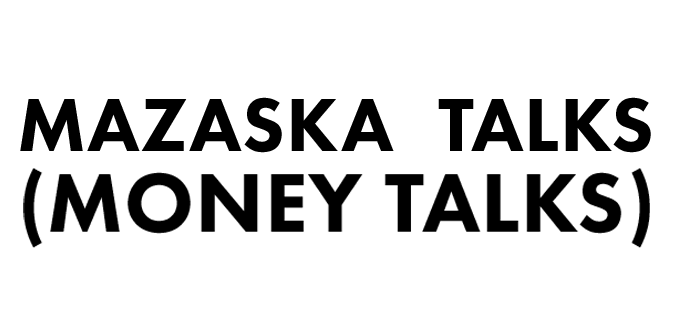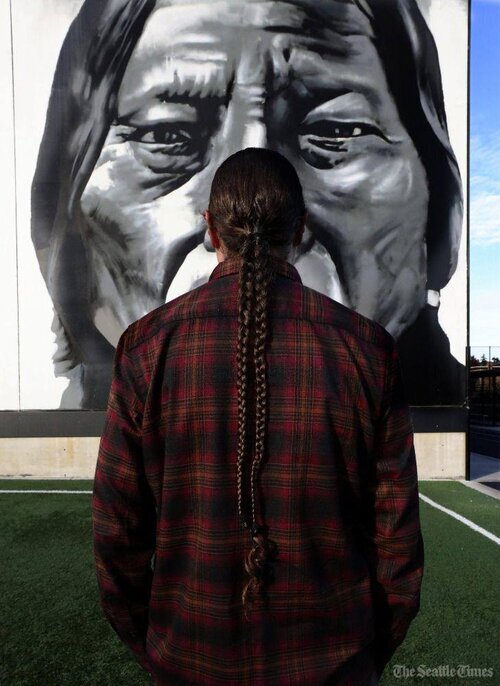In August 2016, I reached out to Seattle city council member Kshama Sawant to see if we could launch an ambitious effort to end Seattle’s financial relationship with Wells Fargo.
We were in the final stages of getting the city to pass a resolution opposing the Dakota Access pipeline, and while expressed opposition to the pipeline was needed, it was clear that Energy Transfer Partners and their collaborators in the local, state, and federal governments were not easing their pursuit to build it. New strategies were needed.
Using the resolution, we would launch a multi month campaign targeting one of the finical backers of DAPL, Wells Fargo.
Throughout the campaign, our messaging to both city leaders and the general public was simple, if you oppose the construction of the Dakota Access pipeline and are against treaty rights violations, then don’t let your money pay for the pipelines construction nor towards the on-going human and treaty rights abuses and violations.
In February 2017, we would win our campaign and succeeded to get the city to pass an ordinance to end its relationship with Wells Fargo and to agree to not take future bids on city contracts from banks that give loans to fossil fuel projects, private prisons, Tar Sands pipelines and other energy intensive projects.
Our organizing did not stop with Seattle and a core group of us re-branded our Seattle efforts under the banner of Mazaska Talks, Mazaska translating to white metal/money in Lakota, and have since worked on numerous divestment and reinvestment campaigns.
The messaging though has remained the same, if you oppose projects like DAPL, Tar Sands pipelines, private prisons, immigrant detention centers, Wall Street capitalist or are in support of other movements for social, economic and/or environmental justice, then ensure that your money, your Tribe’s money, your city’s money and so on isn’t financing the very issues you are organizing against.
It is, of course, counter-intuitive to engage in organizing campaigns or litigation on such projects while continuing to have a banking relationship with the very banks financing the projects you oppose.
It is important to understand that these companies and corporations need loans and/or credit, typically from numerous banks, to finance their projects. It is equally important to understand that these Wall Street banks are driven by the profit motive, period.
Our moral, environmental, social and economic justice pleas to the heads of these banks and shareholders simply will not compel them to stop giving money to these corporations. It is therefore imperative that we ensure that our money does not go to these banks. Divestment.
We should also be mindful of the lengths in which these banks, oil companies and other corporations will go to in order to derail campaigns of social, environmental, Tribal and economic justice.
As the news of Seattle’s divestment from Wells Fargo trended across the globe, Wells Fargo ramped up its efforts to put a good face forward in Indian Country with a good old fashion campaign showing off the money it has thrown at Indian Country. They too understand that money talks.
Wells Fargo is certainly not the only bank to face the wave of divestment campaigns and they are certainly not the only one trying to paint good picture of themselves to the general public.
Due to pressure from water protectors and divestment activists, US Bank had ‘announced’ that it would stop financing oil pipelines to much fanfare only to quietly strike a deal with Energy Transfer Partners, the company behind the Dakota Access pipeline, to the tune of $4 billion in credit.
More recently, every major bank, Bank of America the only exception, have stated that they will not give loans to arctic drilling projects. Bowing to pressure from Alaskan Native organizers and environmental organizations.
JPMorgan Chase likes to highlight its ‘policy’ that states they have a Free, Prior and Informed consent clause relating to projects impacting Indigenous communities, but fails to mention that they rely on their clients to do so in “good faith”.
The Rain-forest Action Network recently exposed JPMorgan Chase as the number one funder of extreme fossil fuel projects.
Soon after we won our campaign victory over Wells Fargo, we quickly began working on banking solutions to handle Seattle’s multi-billion per year budget. We felt that the city simply moving from Wells Fargo to a Bank of America or JPMorgan Chase would not constitute a victory. So we started working on establishing a public bank.
A public, city or state, bank would allow for communities to absolve themselves from Wall Street banks for good. Additionally, a public bank would allow for true re-investment back into our communities. Profits for the people and earth, not CEOs and shareholders.
A public bank movement is underway across the country. Divestment activists in California secured a major victory last fall with the passage of the Public Back Act, which allows for cities and counties to establish their own public banks.
While banks, and more recently insurance companies, have been a central target of divestment campaigns, they are not the only targets. A global effort to get individuals, colleges, non-profits, NGOs, businesses and other organizations to divest from fossil fuels has amassed an impressive feat with the recent announcement that, “11trillion dollars has been committed to divest from fossil fuels.”
Seattle action against Wells Fargo January 2017
Community leaders on divestment
Michelle Cook (Dine) from the Indigenous Women’s delegation to Europe states, “Wells Fargo should invest in indigenous communities by ensuring that their investments, policies, and practices adhere to international human rights standards. Currently, Wells Fargo is still funding companies responsible for indigenous human rights violations. A fifty million dollar donation to Indian communities is a drop in the bucket, compared to the social and environmental costs tribal communities bear when cleaning up oil spills and the social ills left behind by the companies Wells Fargo finances. Indian people need self-determined development and assistance but not from an entity that offers assistance in one hand, but in practice denies and abuses indigenous human rights with the other.”
Rachel Heaton (Muckleshoot) co-founder of Mazaska Talks states, “ This is such a back handed way to help our our communities… these banks throw 100’s of millions and billions of dollars at projects that desecrate our sacred lands, pollute our communities, prey upon the vulnerable, and all for WF’s gains. So because WF has decided to give pennies to tribal communities, compared to the projects they are invested in, the very projects that negatively impact our communities first, we’re suppose to feel good about this. Wake up! these banks are trying to blind those of us not paying attention. They are still contributing to the very things that kill our people, our lands, and our way of life.”
Water protector Joye Braun (Lakota) commented on the National Congress of American Indians [NCAI] taking money from Wall Street banks like Wells Fargo and Bank of America, “NCAI has a choice to make. Will it continue to align itself with a bank, Wells Fargo, known for financing projects that directly affect the health and welfare of tribal nations such as the Keystone XL, line 3 and further tar sands development. Wells Fargo continues to try and greenwash it’s public image by offering monies in grants and gifts to Native organizations while at the same time funding corporate intetests in the billions that threaten our existence and are morally reprehensible to the existence and continue to add chaos to the looming climate disaster awaiting all of us. We can no longer be complacent and be woo’d by such piece meal offerings. NCAI made strong statements regarding climate change and environmental responsibility, that should extend to who it aligns itself with and who they accept money from.”
Sacred Stone Camp founder LaDonna Tamakawastein Allard (Lakota/Dakota) expressed her thoughts on groups, organizations and events taking funds from Wall Street banks, “I have been very cautious of all these environmental groups, NGOS, people claiming to help indigenous people. Where is the money coming from who is control the purse string. We watch as they control people over those purse string. Today we watch as fossil fuel industry funds pow wows and Native gatherings and events. This has cause the old divide and conquer method they have always used against us. We as Native as the poorest people in our own homelands fighting for our existence and our right to live yet we are attacked at every turn we we make. We must stand up against corruption. Mni wiconi.”
Killing life
Climate change is not the only negative impact from the burning fossil fuels. People are already dying. A recent study by the journal Cardiovascular Research estimated that in 2015 3.6 million people worldwide died due to air pollution from the burning of fossil fuels. That is a staggering 10,000 people per day, everyday, dying from fossil fuel pollution.
Journal authors note that, “loss of life expectancy globally “from air pollution surpasses that of HIV/AIDS, parasitic, vector-borne, and other infectious diseases by a large margin. It exceeds the [loss of life expectancy] due to all forms of violence by an order of magnitude and that of smoking by a third.”
Deaths due to exposure from the burning of fossil fuels hits developing countries, low income communities and communities of color the hardest. The study finds, “the mortality from air pollution is dominated by East Asia (35%) and South Asia (32%), followed by Africa (11%) and Europe (9%).” China and India lead the way with an estimated 1.6 million and 700,000 deaths, respectively, in 2015. The United States ranks third, with almost 200,000 deaths in 2015.”
Our non-human relatives are also suffering. A recent report by the the Intergovernmental Science-Policy Platform on Biodiversity and Ecosystem Services found that, “1 million animal and plant species are now threatened with extinction,” due to the burning of fossil fuels.
“Ecosystems, species, wild populations, local varieties and breeds of domesticated plants and animals are shrinking, deteriorating or vanishing. The essential, interconnected web of life on Earth is getting smaller and increasingly frayed,” said Prof. Settele. “This loss is a direct result of human activity and constitutes a direct threat to human well-being in all regions of the world.”
Our decisions are killing the planet.
Rejecting Wall Street handouts
While money thrown into things like scholarship programs, conferences, powwows (yes, sadly, oil companies and banks have surfaced here as well as “sponsors”) and other Tribal programs may be good and in some cases actually help individuals, the reality remains, these banks are financing the destruction of Mother Earth, the mass incarceration of black and brown people, militarism and helping drive global poverty.
We simply cannot allow ourselves to trade the welfare of the places we live, the water we drink, the future of all of our children for the crumbs these banks and corporations throw at us, period.
Divest from Wall Street, pull your money out of these banks financing and profiting from the loss of life, save the planet.
by Wakíƞyaƞ Waánataƞ (Matt Remle- Lakota)
Matt Remle (Lakota) is an editor and writer for Last Real Indians and LRInspire and the co-founder of Mazaska Talks. Follow @wakiyan7



